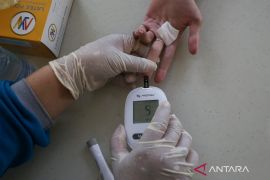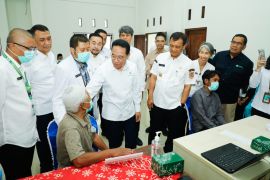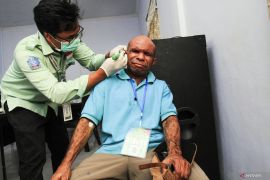Most of them come late. Those who come earlier (have a much better recovery rate). It's important to know about the 10 risk factors and symptomsJakarta (ANTARA) - Early detection of ovarian cancer can help patients get the right treatment and thereby, reduce mortality, according to oncology specialist Oni Khonsa from the Central General Hospital (RSUP) Persahatan.
"Most of them come late. Those who come earlier (have a much better recovery rate). It's important to know about the 10 risk factors and symptoms," Khonsa said at the "AstraZeneca: The 10 Fingers Campaign” webinar here on Saturday.
There are six factors that can put people at risk of ovarian cancer: a history of endometrial cysts, family history of ovarian or breast cancer, genetic mutations, low number of births, poor lifestyle, and increasing age, he informed.
Besides these six factors, there are also four symptoms that can indicate ovarian cancer: flatulence, decreased appetite, frequent urination, and pelvic or abdominal pain.
However, ovarian cancer is not accompanied by symptoms in its early stages.
"If we already have one of the six risk factors and then experience symptoms of flatulence, maybe diarrhea, we should get it checked, even though not all of these symptoms are symptoms of ovarian cancer," Khonsa said.
Related news: Smokers face higher risk of developing tuberculosis: FKUI Professor
He further stressed the importance of being aware of any symptoms that arise because ovarian cancer, unlike cervical cancer, cannot be detected through a pap smear test.
Further, ovarian cancer does not only affect women who have experienced menopause. Young women also have the same risk, especially if they have a close family member with a history of ovarian or breast cancer.
"If there are no symptoms, doesn't mean you don't need to get checked out. Young people also have the same potential," he said.
Related news: Ministry to prepare five provincial hospitals for heart disease
"Then, someone who has a close family with a history of ovarian cancer or breast cancer, they also have the same risk factors. Therefore, we must be vigilant," he added.
According to Khonsa, the lack of information and public knowledge about ovarian cancer is very concerning. However, if detected early, it can be treated and 94 percent of patients live more than 5 years after diagnosis.
When ovarian cancer is still in its early stages, that is, when the cancer is still confined to the ovaries, its handling and treatment have a high chance of being successful, he explained.
"Indonesians tend to be unwilling to do early detection because they don't want to be detected. In fact, if early detection is carried out, the effects will also be much better," he said.
Related news: Intelligence must be coupled with healthy body, mind: President
Related news: Measles-rubella immunization coverage reaches 72.7 %: Health Ministry
Translator: Maria Cicilia Galuh Prayudhia, Katriana
Editor: Fardah Assegaf
Copyright © ANTARA 2022












